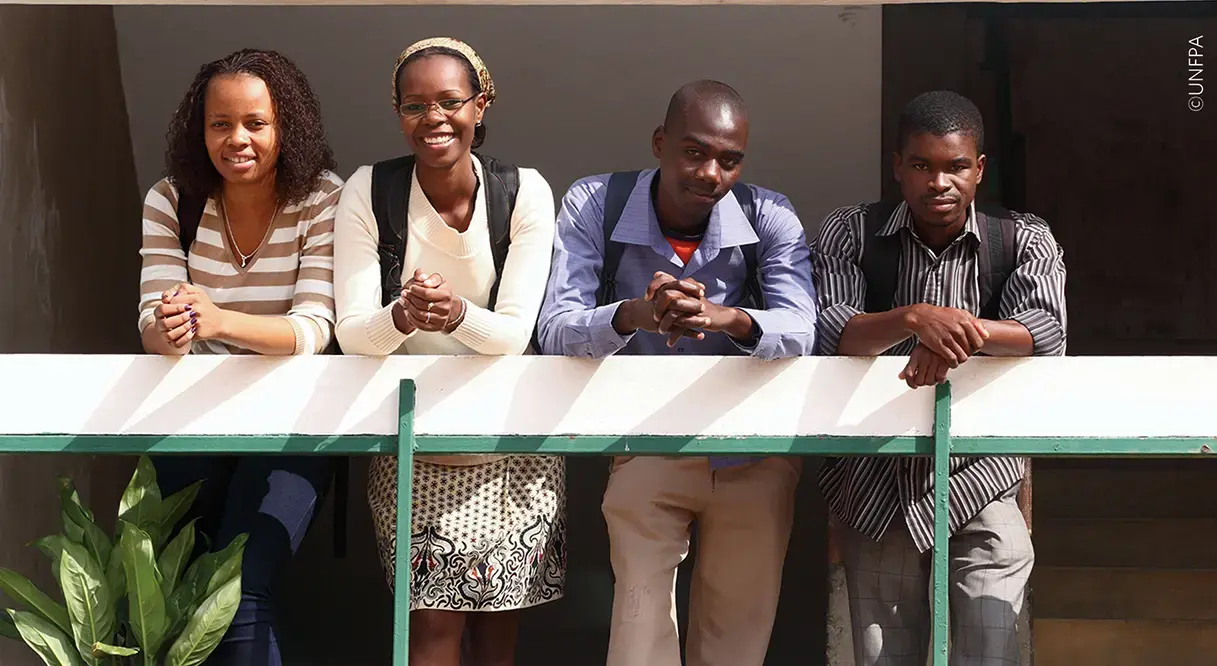Young people constitute the majority of the Angolan population and the largest and fastest growing segment of the population in Africa. The age groups 0-14 years and 15-24 years represent an extremely young population, corresponding to about 65% of the resident population.
The gap between young and old is enormous, with only 2% of the population aged 65 or over. The young population is recognized as an opportunity to renew Africa’s social and economic capital. Angola, like some countries in Sub-Saharan Africa, has a large reservoir of young talent and will continue to enjoy this bonus over the next 15-20 years if investments are made to enable young people to reach their full potential. Teenage pregnancy has been reported as one of the main challenges to be faced in Angola. Accurate indicators to measure the problem and support decision-making are not available. However, this is a recurring theme, observed in the community, in health services, especially in maternity wards and in schools.
In general, in Angola, as in many parts of the world, the teenagers who become pregnant are those with a low level of education, who live in poverty and live in rural and peri-urban areas. When they discover they are pregnant, in addition to facing the conflicts that arise in the family and the frequent avoidance of fatherhood, the teenager usually also drops out of school and becomes concerned with the need to find ways to support herself and her baby. Other problems that directly affect the health of adolescents and young people are the abusive consumption of alcohol and other illicit drugs, as well as road accidents.
When a girl becomes pregnant, her present and future change radically, and rarely for the better.
Statistical Data
Data shows that the average age for women to start having sex is around 13 years old and the proportion of women who have already had their first child by the age of 19 is 55%. As for pregnancies, 3% occur between the ages of 12 and 14, 7% between the ages of 15 and 17, which contributes to around 7.5% of school dropouts. The data also shows that only 29% of adolescents and young people (15-24 years old) have knowledge about HIV transmission and only 29% know the effective ways to prevent transmission.
When a girl becomes pregnant, her present and future change radically, and rarely for the better. Her education may be interrupted, her employment prospects disappear, and her vulnerability to poverty, violence, early marriage, exclusion and dependency increases.
UNFPA's work
UNFPA’s work in Angola focuses on promoting universal access to reproductive health information and services, including family planning for adolescents and young people, with special attention to girls aged 10 to 14. UNFPA uses a range of strategies to support adolescents and young people, including:
- Work with partners to mainstream youth issues into national development and poverty reduction strategies
- Support expansion of and access to sexuality and gender education
- Support implementation of a basic package of health services and supplies for young people.
The expected results for the period 2015-2019 regarding the improvement of the living and health conditions of Angolan adolescents and young people involve strengthening the institutional capacity of the Ministry of Health to offer high-quality integrated family planning, maternal health and STI/HIV prevention services, and increasing the capacity of primary, secondary and ADECOS teachers to implement comprehensive sexual education (ESA) programs in schools and the community.
Priority Actions
Within the work plan of UNFPA and its implementing partners, some priority actions have been identified in order to achieve the expected results, they are:
Ministry of Health:
- Provide technical support for the operationalization of the Commission and Committees for the Prevention of Maternal and Neonatal Deaths;
- Support the MINSA in the evaluation of Emergency Obstetric and Neonatal Care;
- Provide technical assistance in updating national protocols for sexual and reproductive health services, aimed primarily at young people and respecting the cultural context;
- Advocate for the expansion of Youth-Friendly Reproductive Health services, integrating Family Planning and HIV-AIDS;
- Support the Government in implementing the plan to accelerate the response to HIV and AIDS, with a focus on pregnant women, adolescents and young people;
Ministry of Education:
- Support in the monitoring and evaluation of the SADC Interministerial Commitment on the implementation of Comprehensive Sexuality Education (CES) in public schools;
- Provide technical support to update and test existing sexuality education curricula in teacher training courses and primary and secondary schools to ensure they include CSE with a focus on family planning and STI/HIV prevention;
- Strengthen the capacity of MED technical teams to update teachers on disseminating information on CSE;
Ministry of Youth and Sports:
- Advocate for the implementation of the National Youth Development Plan (2014-2017);
- Support MINJUD and the Angolan Youth Institute to implement the Informed, Responsible and Organized Youth Project (JIRO).


